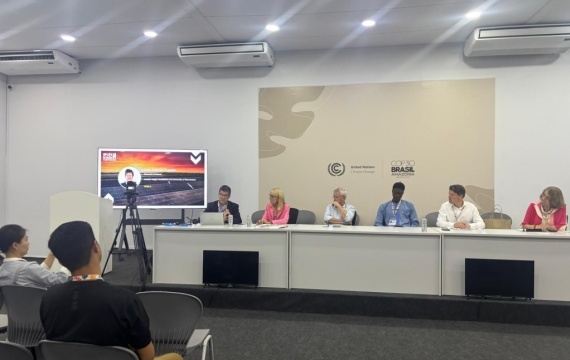FGV Researcher Discusses Sustainable Trade and Climate Action at COP30
On November 13, the COP30 Blue Zone hosted the session Leveraging Trade and Investment for a Low-Carbon and Sustainable Future, organized by UNCTAD, dedicated to exploring how sustainable trade and investment can drive more ambitious climate actions, strengthen resilient and low-emission value chains, and promote international cooperation.
The event, which featured José Antonio Puppim, researcher at FGV, brought together experts and representatives from different sectors to share experiences and policy instruments capable of aligning economic development with the 1.5°C target, social justice, and climate resilience.
The discussion was based on the premise that sustainable trade and investment are key drivers of economic growth and climate goals, by enabling access to clean technologies and accelerating the transition to low-carbon economies. In this context, integrating trade and investment policies into Nationally Determined Contributions (NDCs) is essential to align development and climate objectives, especially amid negotiations addressing trade-related measures, cross-border impacts, and just transitions.
In his presentation, Puppim reflected on the impacts of transnational regulations, such as European legislation. His analysis drew on research results from the Amazônia +10 project, supported by the São Paulo Research Foundation (FAPESP) and other international funding organizations.
The researcher mentioned rules such as the Regulation on Deforestation-free Products (EUDR) and the Carbon Border Adjustment Mechanism (CBAM) of the European Union:
“This can represent both an opportunity and a challenge for integration into international trade, considering these standards,” he highlighted.
Puppim emphasized that Brazil has competitive advantages but also faces challenges:
“We are well prepared in the energy sector because we have a highly sustainable energy matrix. This can put our companies ahead of competitors like the Chinese. On the other hand, we need to adjust Brazil’s carbon market, which is still developing, to create a more competitive environment. These regulations will also impact our carbon market,” said Puppim, professor at FGV EAESP and coordinator of the FGV Earth research center.
He also warned about risks and opportunities in agribusiness:
“Sectors such as agribusiness may be negatively affected if we do not take advantage of this change in standards as an opportunity for improvement. Therefore, there are two sides we need to consider.”
Finally, Puppim reinforced that sustainable trade and investment can be a strategic advantage for the country:
“Opening trade and investment to sustainability allows us to attract resources, as today a large part of trade incorporates this aspect. Countries that anticipate and adapt their policies to include sustainability factors will be ahead and will attract these investments.”
To learn more, visit the FGV Earth website.
Full coverage of Fundação Getulio Vargas’ participation in COP30, including agendas, exclusive content, and contributions from the institution’s researchers to global climate action, is available on the FGV Climate Agenda Platform. The opinions expressed in this publication are the sole responsibility of the contributing researchers and do not necessarily reflect the official position of Fundação Getulio Vargas.
